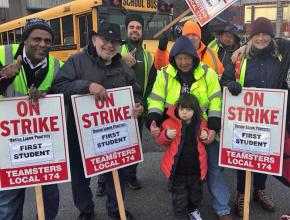Fed up with disrespect
After only seven days on strike, Seattle school bus drivers, represented by Teamsters Local 174, won a new contract with First Student that achieved two of workers' main demands, health care and pensions. Most of the more than 400 Seattle school bus drivers were present for the vote on February 10, where the offer passed with 97 percent approval.
Negotiations went into high gear after Seattle teachers staged a part-day strike in support of drivers on February 7. They rallied at picket lines and at schools backing the drivers' demands. In this interview, talked to a striker at First Student with years on the job as a bus driver in Seattle about what this strike meant.
WHAT DID the strike win for the drivers?
THERE WERE several issues. For the first time, all the drivers, full and part time, will be offered health coverage for themselves and their dependents. The company will pay 82 percent of the cost, with employees picking up the remaining 18 percent. This coverage will start in September 2018. This will be affordable for most drivers.
Drivers who don't join the medical plan will be offered a bonus of up to $2,000 every year to pay toward other plans. This will mainly affect drivers who have retired from other jobs and are already on Medicare. This is about a third of the drivers.
The other main issue was pensions. For the first time, the company will pay into a pension plan for the drivers. The company will pay 50 cents per hour toward a pension plan run by the Teamsters Western Conference. This started as soon as strikers accepted the offer and returned to work.
Both of these are gains that we didn't have before. As far as we know, no other First Student bus drivers in the U.S. have these benefits.

This strike was over a contract reopener on health care and pensions, so there was no wage issue involved. The contract expiration was extended from 2020 to 2021.
DID YOU think this was a good settlement?
THE UNION got us everything they promised, but whether we got everything we deserved is another question. I was one of the 3 percent that voted no. I thought we could have gotten more if we stayed out longer.
WHY DO you think the company gave in so quickly?
THE MAIN thing was solidarity. Very few drivers crossed the picket line. The company thought they could divide the workers more than they were able to. When they saw that unity, they offered a settlement.
The support from other unions and workers and community members helped, too. The fact that the teachers came out on strike during their prep period on February 7 showed the company that there was a potential of shutting the schools down.
The teachers' union never voted to go on a full-out strike in solidarity with the bus drivers. If they had, the company would have been forced to give in, because that would have brought the schools down.
On the day the teachers went on strike and rallied in solidarity with us, we had gigantic picket lines. Both sides of Lake City Way, where the north lot is, were packed with teachers and other supporters. It was right after that when the company caved in.
It also helped that socialist City Councilor Kshama Sawant issued a letter, putting pressure on the company and demanding that the school district fine the company as allowed under their contract. The strikers urged her to do this.
WHAT DO you think of the union's strategy?
EVEN THOUGH a teachers' strike would have shut the schools, the union leaders didn't want to encourage that. They thought that leaving the schools open without bus service would put more pressure on the company.
This is because the contract between First Student and Seattle Public Schools allowed the district to fine the company up to $1.2 million per day for any day that they could not transport the students to school. I was dubious about this strategy.
WHY DID the bus drivers stay together so well?
IT WAS about respect. Workers felt disrespected by the company and wanted to teach the company a lesson.


